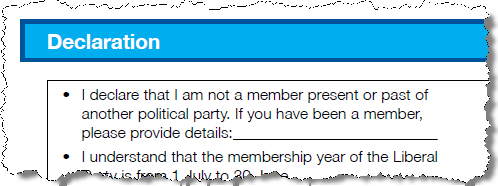There are more people on the waiting list to join the Melbourne Cricket Club than there are rank-and-file members in all Australian political parties put together.
Political parties’ dwindling membership — and the ambivalence or antipathy with which the public apparently views them — has been in the news lately. Gone are the days when the major parties had well over 100,000 members each (the Liberals once pushed 200,000). Nowadays, no party has more than 50,000 members; anecdotes abound of sparse meetings, attended mainly by older people.
That means parties may struggle to remain connected to (and representative of) society; decisions around political agendas, policies and personnel are being made by an increasingly small pool of veterans and party careerists. Where are the good ideas and fresh faces going to come from?
Both Labor and the Coalition have conducted high-profile internal reviews on how to reform their parties and lure more members. Prime Minister Kevin Rudd has proposed rank-and-file members have a role in electing the ALP leader (50% of the votes would go to members, 50% to caucus; at present only the Labor caucus elects the leader). Rudd’s plan will go to a special caucus meeting on Monday; polls indicate the public likes the plan, and Rudd backers claim it will boost party membership.
Crikey decided to investigate which parties, clubs and societies Australians belong to. We found political parties are not popular — there are far more members in the RSL, the MCC and the low-profile Federation of Australian Historical Societies than in any party. There are more Scouts than Liberals, there are more Freemasons than ALP members, and there are more people in the Rebels Motorcycle Club than in Katter’s Australian Party (although membership may overlap on that one).
And this is despite the fact that political parties are comparatively cheap. It’s cheaper to sign up to the ALP or the Liberals in some states ($50-60 a year) than it is for a baby to become a member of Collingwood Football Club ($66).
Political parties do have quite strict and extensive entry requirements compared with other clubs. Parties insist people who join must not be members of any other political party, and some demand disclosure on previous political party membership (plus dates and branches). Members usually have to sign a party pledge, sometimes via a list of principles, and some parties require union membership (e.g. the ACT ALP) …
Victorian ALP members must sign the pledge above
NSW Liberals must come clean on previous party membership
One Nation members must agree to this
Interestingly, most party members Crikey spoke to said the major factor that boosted (or sandbagged) membership was the unpopularity of the other side. Liberal membership soared under Gough Whitlam; the Queensland LNP thrived in the final years of the state ALP government. Membership also tends to rise ahead of elections.
A note of caution: parties are notoriously secretive about their membership numbers. Crikey found the Freemasons were far more open and transparent on their membership than the Liberals, Nationals or Labor. No party goes public with its numbers, some put out fake figures, and some senior figures in parties do not know the answer. Crikey has the impression that no one in the Nationals actually knows how many members the party has. A complicating factor is that most are federations of state-based parties.
UPDATED: In a media conference on July 22, Kevin Rudd told reporters the ALP had 44,000 rank-and-file members. This comes after senior Labor figures claimed membership had risen in recent weeks due to Rudd’s plan to give members a say in electing the ALP leader.
Here are the results of Crikey‘s investigation. The table runs from largest to smallest, with political parties in bold …
table.tableizer-table {
border: 1px solid #CCC; font-family: ;
font-size: 12px;
}
.tableizer-table td {
padding: 4px;
margin: 3px;
border: 1px solid #ccc;
}
.tableizer-table th {
background-color: #CD0404;
color: #FFF;
font-weight: bold;
}
| Party, club or society | Number of members | Cost of annual membership |
|---|---|---|
| GetUp! | Claims to have 632,000 ‘members’; may include everyone who has ever contacted them | Free to join, then solicits donations |
| RSL | Says it has over 240,000 members | $25-40 for ex-service personnel, $2 for community membership |
| Melbourne Cricket Club | 102,800 members, a further 225,000 have paid to be on the waiting list | Entrance fee $900, plus annual fee of $475-609. 25-year waiting list. Dress standards apply. |
| Engineers Australia | ‘Approximately 100,000 members’ | $518 for professional engineers, undergraduates free. Strict entry requirements (certified copy of degree) |
| Federation of Australian Historical Societies | ‘Approaching 100,000 members’ | $15-45 |
| Collingwood AFL club | 76,000 | Basic membership $90, reserved seating $378, baby membership $66 |
| Scouts Australia | ‘Around 66,000 members’ | Around $200, plus excursions / uniform |
| Liberal Party (includes Queensland LNP) | 40,000-50,000. Of these, 13,000-14,000 believed to be in Qld LNP. Victoria traditionally the powerhouse state | $60-95 adult, $22-$35 concession, $950 to be a ‘party patron’ |
| CWA | 40,000-45,000 | $37 |
| Freemasons | 40,700 | $250-300. Must be male |
| ALP | 37,000-40,000 | Depends on salary. $50-$120 waged, $50 unwaged. Discount for union members |
| Rotary | 33,000 | $200-250 |
| The Greens | 9500 (membership has dropped from 10,000 recently) | Depends on salary, up to $135 for higher incomes. $30-$60 concession |
| The Nationals (excluding LNP) | In the ‘tens of thousands’, no one seems to know. Queensland Nats used to be the powerhouse state | Adult $120, pensioner $40, gold member $1800 |
| The Australian Sex Party | 5583 | ‘Doing well’ $100, ‘short of cash’ $200 |
| One Nation | Told Crikey more than 5000, has risen since Pauline Hanson rejoined | $10 adult, $5 pensioner |
| Rebels Motorcycle Club (largest outlaw motorcycle club in Australia) | Rumoured to be 2000, would not confirm this with Crikey | Difficult to join, costs not known |
| WikiLeaks party | 1500 | $20 |
| Katter’s Australian Party | 1500 | $33 adult, life membership $1100 |
| Palmer United Party | ‘Several thousands’, would not reveal number to Crikey (the KAP and the PUP accuse each other of poaching members) | $20 adult, $10 concession |
| The Australian Democrats | Just over 1000 | $55 adult, $35 concession |
| Rise up Australia (anti-multicultural, linked to Catch the Fire ministries) | Did not respond | $20 adult, $15 pensioner. Quite demanding entry rules, asks about church membership. Has official party song |
| Doctor Who Club of Australia | Did not respond | $21 adult, $10 child |
| Austrek (oldest Star Trek fan club in Australia) | Did not respond | $30 adult, $25 concession |
| The Pirate Party | 750 | $20 |










As of yesterday the Australian Sex Party memberaship is 5,583 We don’t ask if people are members of other parties. We have been called non-monogamous in this area. We ask people to pay using the following formula:
Short of cash $20
Doing okay $50
Doing well $100
What are those fabian terrorist warmists at AusTrek trying to hide huh?!?
I joined a minor party once, now defunct. That was a pretty informal affair. A friend asked me to, because the party needed the numbers to get registered. It is the only time in my life anyone has personally invited me to join any party.
I got serious, once, about joining one of the larger parties currently in parliament. I went through a web form, filling in details, and came to a bit that I agreed to abide by their constitution or something along those lines. I stopped to download and read the document in question. I never finished it and I never joined the party. Nowadays, I doubt I would ever again join any party because I don’t want to sign away my freedom to act and vote as I choose.
Thank you Fiona. I will add your party into the table, you will come in above One Nation and below the Nationals. Not sure what you’ll make of that!
Just heard this from an insider:
“… the Federation of Australian Historical societies counts everyone who is a member of any historical society in Australia as a member of FAHS, whether they want to be or not. Most of them wouldn’t know they were being counted as members – they don’t have to sign up or anything. So it’s all a bit bogus.”